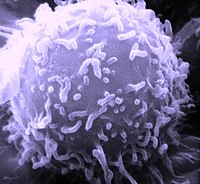
Photo from wikipedia
Malaria remains an important global disease. Despite significant advances over the past decade in reducing disease morbidity and mortality, new measures are needed if malaria is to be eliminated. Significant… Click to show full abstract
Malaria remains an important global disease. Despite significant advances over the past decade in reducing disease morbidity and mortality, new measures are needed if malaria is to be eliminated. Significant advances in our understanding about host immune responses during malaria have been made, opening up opportunities to generate long-lasting antiparasitic immunity through vaccination or immune therapy. However, there is still much debate over which immune cell populations contribute to immunity to malaria, including innate lymphocytes that comprise recently identified innate lymphoid cells (ILCs) and better known innate-like T cell subsets. Here, we review research on these immune cell subsets and discuss whether they have any important roles in immunity to malaria or if they are redundant.
Journal Title: Trends in parasitology
Year Published: 2019
Link to full text (if available)
Share on Social Media: Sign Up to like & get
recommendations!